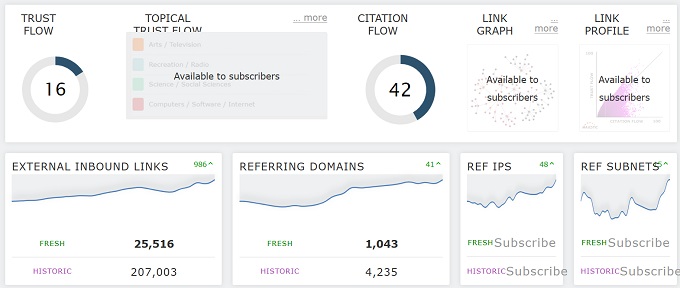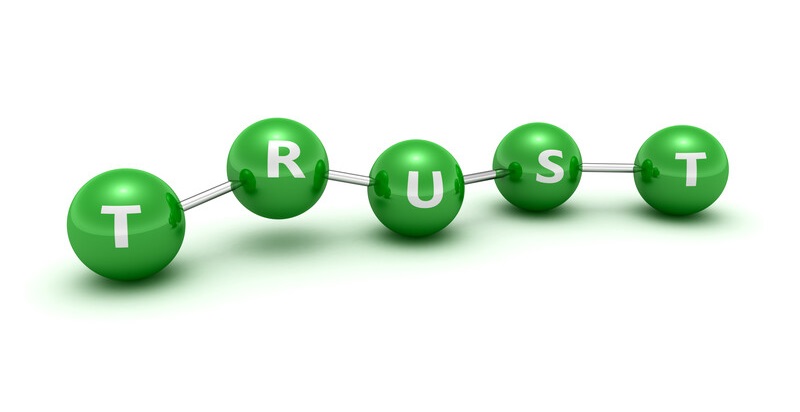Trust Flow: A Very Important SEO Metric
Are you troubled by your lagging Google rankings and less than ideal traffic?
There’s a range of issues that might be hampering your free Google rankings and traffic. It’s important to note that you can have rankings and still have low traffic from Google search. It’s very complex what they do.
Fortunately, there are solutions. In this post we explore one single component of Google’s ranking algorithm.
This one element of the Google ranking algorithm has gained particular prominence for many years. Not much is known about it which suits Google fine. Writings about it are rate. It’s not an easy thing to solve. And Google would prefer that their secret sauce to remain unknown so they can fulfill their private business objectives.
So while you’re creating great content, using ChatGPT tools, and overoptimizing your site, you may still find your site’s performance disappointing. You sill have to get Google to trust and respect your site and pages. This is a big project often requiring high-quality content, networking, strong promotion and a good budget to get it all done.
What is Trust Factor and Trust Flow
Trust Factor as some know it, is your reputation to Google as a calculated value, so Google can rank your pages. Trust flow refers more to the active flow of reputation value via links and citations (citation flow).
Manage it professionally because it’s powerful. Remember the old adage, “you’re known for the company you keep.” And what other reputable sites say about your brand/company determines your trust factor, and what you say about others matters. Trust, like a reputation, can be sticky.
And with AI computing, Google can read more into what other websites are saying about you and precisely what’s meant. This is the new factor that most SEO’s are behind on. A good AI SEO pro will help you groom those good vibes.
I think you might enjoy this brief exploration of trustworthiness in SEO, as it gives you insights into Google’s indexing machine along with some new confidence that you can succeed in the rankings. Tons of backlinks are no miracle solution anymore. Rankings and traffic result from signals of trust, quality, and relevance, so et’s explore this so you understand your organic search challenges and what you need your SEO pro to accomplish.
Google Denies
Before we start, Google’s search team have indicated that Trust isn’t used in its algorithm. Yet, on occasion, their tech chief [John Mu] responds in his online posts and conversations “…then Google might not trust your site.” Interesting dichotomy.
Because Google demotes and deletes spam, persistent low quality content, which tells you Trust is an issue!
Instead, [John Mu] has indicated that it’s better to look at Trust more practically from a user-relevance standpoint. If content is extremely relevant to a user, then it may be more trustworthy. So he’s sort of saying that trust is minor, and that being high-quality and hyper-relevant for all your different users is more what Google is interested in.
* note: To respond to that, in performing SEO, I actually have a tactical strategy for that very user intent challenge. It’s very effective and maximizes the trust factor you have to leverage. Check out my SEO services.
The point I’m making here is that despite what Google says (avoiding trust discussions), we should be trying to make our content, brand, and user experience more trustworthy. And yes, it must be informative to users, authoritative, inviting, persuasive, comfortable, entertaining and help close the sale. The torturous life of an SEO copywriter.
The Elements of Trust
You may have lots of backlinks to your website yet find they don’t provide a sufficient boost for your rankings. The reason for that is that Google may not trust the sites linking to yours sufficiently (or their irrelevant, weak sites). It’s not just that they’re off-topic and unrelated to your keywords and industry. It’s because those sites aren’t trusted. They may transfer no value to your site.
When other websites link to yours, they deliver something called Trust Flow as we defined. It’s not just that those sites might be spammy, unreputable, and offering paid links. The issue is whether they’re a credible, reliable, trusted resource by users and by Google’s trust rank system.
Google interprets trust by the hyperlinks it finds and follows, what’s said about the site linked to, and about the network of links a site is involved in. So when you create links, you’re creating a neighborhood, and Google demotes sites in “bad neighborhoods.” Thus your rankings will lag or fall.
Can Technical Issues Matter?
There are a few technical aspects of trust as well. Google includes it in its E.A.T quality concept. It includes transparency about the author and Https server protocol, as well as server performance issues. If user experience is ruined, Google won’t trust your site as much.
Overall, to get over your ranking frustration, you’ll need to focus more on Trust Flow.
So let’s look closer at this topic so you can have your SEO provider increase your ranking power.
Majestic is one of the few that offers insights and tools to help define Trust Flow and find sites that can help grow it. I don’t have an account currently, but likely will soon.
What is Trust Flow?
Trust Flow is a metric trademarked by Majestic SEO which analyses how trustworthy a site is by measuring its quality. Quality is the essential data of this metric. If a link pointing to your website is authoritative and qualitative, then your trust flow will increase. — Emma Labrado of oncrawl.com
Majestic really helps us understand what is one of the most complex and challenging topics on SEO.

My client above lacks Pagerank, inbound links, and apparently Trust flow too. It’s an exclusive industry where others may not link out very easily (silos). Competition makes link-building a tough challenge and requires large promotional budgets and media networking. However, that hasn’t stopped the site from performing well on some productive keywords. Still, competing with Goliath competitors requires many stronger ranking signals including Trust Flow.
If your competition have 20 to 40 times the ranking power you do, you’ll need a very good SEO pro! Skilled search engine optimization can still generate rankings, traffic and help grow backlinks. You’ll find that with today’s SEO, strong ongoing promotion is required to rank well.
Guru’s of Link Building
The guru of backlinking, Brian Dean on his site (Backlinko.com) reiterated this comment from Google:
“So PageRank is the most well known type of trust. It’s looking at links and how important those links are. So if you have a lot of very high quality links, then you tend to earn a lot of trust with Google. There’s over 200 different signals that we use in our ranking.”
In the above passage, I’ve linked to Brian Dean’s website using the branded term “Brian Dean” and discussing link building. This sends a strong signal to Google that his website and himself as an author, are relevant on the topic of linking and trust flow. My site’s content is on links, SEO, content, AI and more. So all of that information value is transfered to his site. Whether I meant it or not, Google assumes it’s a recommendation of trust and authority.
Google has said however, that it doesn’t use Trust Rank. Yet, it has to measure trust in some way relative to a topic or how could it rank pages for search queries? When you get close to Google’s secret sauce, they might get defensive.
“But you can kind of break them down into this notion of trust and how well you match a particular query. We use several words – reputation, trust and authority” — adds Google.
Components of Trust Flow
Majestic has its own interpretation of Trust Flow, based on their branding and business goals, yet they’re fairly unclear about it. Their coverage is dated from 8 to 12 years ago. Moz SEO app too offers up its MozTrust ratings.
We can take what they describe and combine it with what we know about what Google takes into account about trustworthiness:
- topic trust flow (trustworthiness of a link based solely on the topic and page involved that is linking to your site)
- domain trust factor (overall, the trustworthiness of a domain based on the trustworthiness of a website)
- credibility/authority (links from sites that are popular, highly engaged, have good rankings, and plenty of inbound links show it is trusted by users)
- outbound links (outbound links from your pages that are to poor quality pages or irrelevant topics) (negative)
- positive brand mentions which indicate your company and reputation are good
- participation in link schemes (linking within bad neighborhoods) (negative)
- your links and brand name used in good content neighborhoods (positive)
- paid links (negative)
- your site’s bounce rate (visitors leave fast) (negative)
- negative sentiment about your business or website or posts (negative)
- negative SEO perpetrated against your site (negative)
- active on your own social media sites (linked from your website)
- links from major trust sites such as .gov, .edu, business associations, research sites, and major web portals
- reputable content (sensational, incorrect, YMYL content on page)
- low quality content (low quality content means it can’t be trusted as an authoritative resource) (negative)
- weak coverage of a topic (not enough content on your site to support your full comprehension and coverage of a topic) (negative)
- overoptimization of content for SEO (negative)
- special no-go topics (Google said they may punish sites that criticize the government or who refute global warming)
Trust Flow Freshness and Pace of Growth
Google is constantly reassessing your trust flow and topic-specific trust flow. This means that changes to the Trust flow rating of all the sites that link to your site, or which mention your site and business, will in turn affect the flow of trust you receive.
This is why SEOs try to convince website owners/publishers to switch links to their site. The loss of that link and mention can create severe losses of very valuable trust factor.
As your rate of new inbound links and trust flow diminishes, your rankings will slowly fall too. Conversely, a faster rate growth of Trust flow to your site will slowly raise your rankings.
How to Raise Trust Factor and Trust Flow
- find relevant industry websites where you can contribute guest posts
- build your social media connections with relevant industry people and engage with them
- write high quality authoritative and inviting blog posts and share on social media
- connect with journalists and industry bloggers (share their posts)
- mention relevant companies in your blog posts (they will find yours and may mention your site/post in return
- disavow any very harmful links to your site (Google does a good job, you may need to create a disavow file still
- promote your very best content via your newsletter or via advertising (boost posts)
- ensure you include your brand in any lists of competitors and ask research firms to include your brand in their research (offer them data and insights for their research studies).
- keep your posts dignified and professional, and cite other authorities, authorities, and highly trusted websites (and link to them as appropriate)
- create a privacy notice, terms of use and/or affiliate disclosure
- ensure you have an about us page with links to key sites where you are somehow validated
- use SEO software including Majestic SEO to find relevant websites including popular, high-ranking websites that link to your competitors
There’s a lot that’s unknown about Trust Flow within the Google Algorithm. They do not divulge their secret sauce. Yet we know trust is a big issue on the Internet. Consider deep fake technology in video, Generative AI content (ChatGPT), constant self-promotion and exaggeration, fake news, and amateur health enthusiasts speaking as though they’re doctors. Trust is an issue.
And with the growing complexity of how Google indexes pages, it is very difficult to understand how Trust flow is calculated or used.
Understanding trust in the algorithm can’t hurt your SEO strategy. And I believe that focusing on the task of making your site more trustworthy to Google and your users on a topical basis is one of the most important aspects of SEO work.
Websites and pages are entities, keywords are entities and topics are entities. As an SEO and content pro, I align these perfectly in a way Google trusts and likes.
Get in touch with me (416 998 6246) to discuss your business, goals and challenges.
AI Marketers provides digital marketing services (content, SEO, social media, PPC) for software companies, manufacturers, hotels, recruiters, moving companies, publishers, sports equipment retailers, building supplies companies, window and door companies, Realtors, investment companies, IT companies, clean energy, consumer products, branding consultants and many more.
Advanced SEO Solution | SEO Company | Link Building | How to Gain High Rankings | State of SEO Report | Top Priority is SEO | AI Marketing Software | Advanced SEO Strategy | SEO Software | Hotel SEO | Calgary SEO Service | San Diego SEO Company | Boston SEO Company | Linkedin SEO







